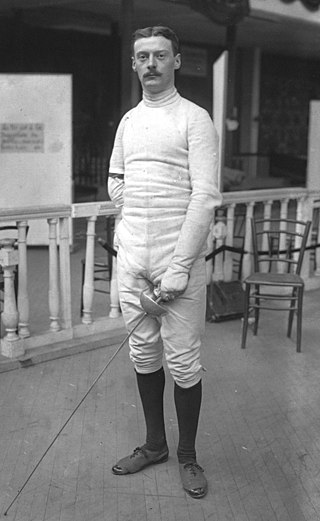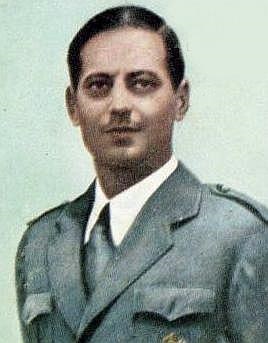
The men's épée was one of four fencing events on the Fencing at the 1908 Summer Olympics programme. The competition was held from 17 to 24 July 1908 at the Franco-British Exhibition fencing grounds. There were 85 competitors from 13 nations. Each nation could enter up to 12 fencers. The medals were swept by the French fencers, who also took the gold medal in the team épée event. Gaston Alibert was the gold medalist, with Alexandre Lippmann taking silver and Eugene Olivier bronze. Officially, it was the second consecutive medal sweep in the event, though two of the three "Cuban" fencers who medaled in 1904 were actually American.

The men's foil was one of eight fencing events on the fencing at the 1964 Summer Olympics programme. It was the fourteenth appearance of the event. The competition was held from October 13 to October 14, 1964. 55 fencers from 21 nations competed. Nations had been limited to three fencers each since 1928. The event was won by Egon Franke of Poland, the nation's first victory in the men's foil. France returned to the podium after a one-Games absence, with Jean-Claude Magnan taking silver and Daniel Revenu the bronze.

The men's épée was one of eight fencing events on the fencing at the 1964 Summer Olympics programme. It was the fourteenth appearance of the event. The competition was held from October 18 to 19 1964. 65 fencers from 25 nations competed. Each nation was limited to three fencers. The event was won by Grigory Kriss of the Soviet Union, the nation's first gold medal in the event after a bronze four years earlier. The Soviets also took bronze, with Guram Kostava finishing in third place. Between the two was silver medalist Bill Hoskyns of Great Britain; it was the second consecutive Games with a British silver medalist in the event. Italy's six-Games gold medal streak in the men's individual épée ended with the nation missing the podium entirely; Gianluigi Saccaro finished fourth after losing the bronze-medal barrage to Kostava.
The men's épée was one of seven fencing events on the Fencing at the 1924 Summer Olympics programme. It was the sixth appearance of the event, which had not been on the programme in 1896. The competition was held from Wednesday, July 10, 1924 to Thursday, July 11, 1924. 67 fencers from 18 nations competed. Nations were limited to four competitors each. The event was won by Charles Delporte of Belgium, the nation's second victory in the individual épée. Silver went to Roger Ducret of France. Nils Hellsten earned Sweden's first medal in the event with his bronze.

The men's épée was one of seven fencing events on the Fencing at the 1928 Summer Olympics programme. It was the seventh appearance of the event. The competition was held from 6 August 1928 to 7 August 1928. 59 fencers from 22 nations competed. Each nation could have up to three fencers. The event was won by Lucien Gaudin of France, the nation's third victory in the individual men's épée—taking sole possession of most among nations above Cuba and Belgium, each at two. Gaudin was the second man to win both the foil and épée events at a single Games. It was the third consecutive Games at which France reached the podium in the event. Two Frenchman had reached the head-to-head final; Gaudin won over Georges Buchard, who received silver. Bronze in 1928 went to American George Calnan, the nation's first medal in the event.
The men's team foil was one of seven fencing events on the Fencing at the 1928 Summer Olympics programme. It was the fourth appearance of the event. The competition was held from 29 July 1928 to 30 July 1928. 88 fencers from 16 nations competed.
The men's team sabre was one of seven fencing events on the Fencing at the 1928 Summer Olympics programme. It was the fifth appearance of the event. The competition was held from 8 August 1928 to 9 August 1928. 65 fencers from 12 nations competed.

The men's épée was one of seven fencing events on the fencing at the 1932 Summer Olympics programme. It was the eighth appearance of the event. The competition was held from 8 August 1932 to 9 August 1932. 28 fencers from 12 nations competed, with three others entered but not starting. A maximum of three fencers per nation could compete. The event was won by Giancarlo Cornaggia-Medici of Italy, with his countryman Carlo Agostoni taking bronze. They were the first medals for Italy in the men's individual épée. France reached the podium for the fourth consecutive Games in the event with Georges Buchard's silver. Buchard was the third man to win multiple medals in the event, repeating his second-place finish from 1928.
The men's team épée was one of seven fencing events on the fencing at the 1932 Summer Olympics programme. It was the sixth appearance of the event. The competition was held from 5 August 1932 to 7 August 1932. 32 fencers from 7 nations competed, with two other nations entering but not appearing. Each team could have a maximum of six fencers, with four participating in any given match.

The men's sabre was one of seven fencing events on the fencing at the 1932 Summer Olympics programme. It was the ninth appearance of the event. The competition was held from 12 August 1932 to 13 August 1932. 25 fencers from 12 nations competed. Five additional fencers entered but did not start. Each nation was limited to three fencers. The event was won by György Piller of Hungary, the third of nine straight Games in which a Hungarian would win the event. Giulio Gaudini of Italy took silver, while another Hungarian earned bronze.

The men's épée was one of seven fencing events on the fencing at the 1936 Summer Olympics programme. It was the ninth appearance of the event. The competition was held from 9 August 1936 to 11 August 1936. 68 fencers from 26 nations competed. Nations were limited to three fencers. The event was won by Franco Riccardi of Italy, the nation's second consecutive victory in the men's épée. Riccardi's teammates Saverio Ragno and Giancarlo Cornaggia-Medici took silver and bronze, respectively, to give Italy a medal sweep—Italy's first and the fourth overall in the event. Cornaggia-Medici, who had won gold in 1932, became the fourth man to win multiple medals in the individual épée. For the first time, France competed in the event but did not win any medals.
The men's team épée was one of seven fencing events on the fencing at the 1936 Summer Olympics programme. It was the seventh appearance of the event. The competition was held from 7 August 1936 to 8 August 1936. 108 fencers from 21 nations competed. Each team could have a maximum of six fencers, with four participating in any given match.
The women's foil was one of seven fencing events on the fencing at the 1936 Summer Olympics programme. It was the fourth appearance of the event. The competition was held from 4 August 1936 to 5 August 1936. 41 fencers from 17 nations competed, with one additional fencer entered but withdrawing. Nations were limited to three fencers.

The men's épée was one of seven fencing events on the fencing at the 1948 Summer Olympics programme. It was the tenth appearance of the event. The competition was held from 7 August 1948 to 9 August 1948. 66 fencers from 25 nations competed. The event was won by Luigi Cantone of Italy, the nation's third consecutive victory in the men's épée. Italy also earned its third consecutive bronze medal in the event, with Edoardo Mangiarotti's third-place finish. Between the two Italians was Oswald Zappelli of Switzerland, taking the silver medal.
The men's team foil was one of seven fencing events on the fencing at the 1956 Summer Olympics programme. It was the ninth appearance of the event. The competition was held 23 November 1956. 50 fencers from 9 nations competed.

The men's épée was one of seven fencing events on the fencing at the 1956 Summer Olympics programme. It was the twelfth appearance of the event. The competition was held on 30 November 1956. 41 fencers from 18 nations competed. Nations were limited to three fencers each. The event was won by Carlo Pavesi of Italy, the nation's fifth consecutive victory in the men's épée. In all five of those Games, Italy earned at least two medals in the event; this was the second sweep during that period for Italy. Giuseppe Delfino was the silver medalist while Edoardo Mangiarotti took bronze. It was Mangiarotti's third medal in the event, along with gold in 1952 and another bronze in 1948; he was the first man to win three medals in the individual épée.
The men's team épée was one of seven fencing events on the fencing at the 1956 Summer Olympics programme. It was the tenth appearance of the event. The competition was held on 28 November 1956. 55 fencers from 11 nations competed.

The men's épée was one of eight fencing events on the fencing at the 1960 Summer Olympics programme. It was the thirteenth appearance of the event. The competition was held from 5 to 6 September 1960. 79 fencers from 32 nations competed. Each nation was limited to three fencers. The event was won by Giuseppe Delfino of Italy, the nation's sixth consecutive victory in the men's épée. Delfino, who had taken silver in 1956, was the seventh man to win multiple medals in the event. Silver went to Allan Jay of Great Britain and bronze to Bruno Habārovs of the Soviet Union, the first-ever medal in the event for both nations. It was the first time during Italy's gold-medal streak that the nation did not have a second medalist as well.

The men's team épée was one of eight fencing events on the fencing at the 1960 Summer Olympics programme. It was the eleventh appearance of the event. The competition was held on 9 September 1960. 105 fencers from 21 nations competed.

The men's épée was one of eight fencing events on the fencing at the 1976 Summer Olympics programme. It was the seventeenth appearance of the event. The competition was held from July 22 to 23 1976. 64 fencers from 26 nations competed. Each nation was limited to 3 fencers. The event came down to a three-way barrage among the medalists, with two West German fencers joining Győző Kulcsár of Hungary in this tie-breaker fencing session. Alexander Pusch won against both opponents in the barrage to take gold, with Hans-Jürgen Hehn defeating Kulcsár for silver. The medals were the first for West Germany in the men's individual épée. Kulcsár's bronze made him the second man to earn three medals in the event.









